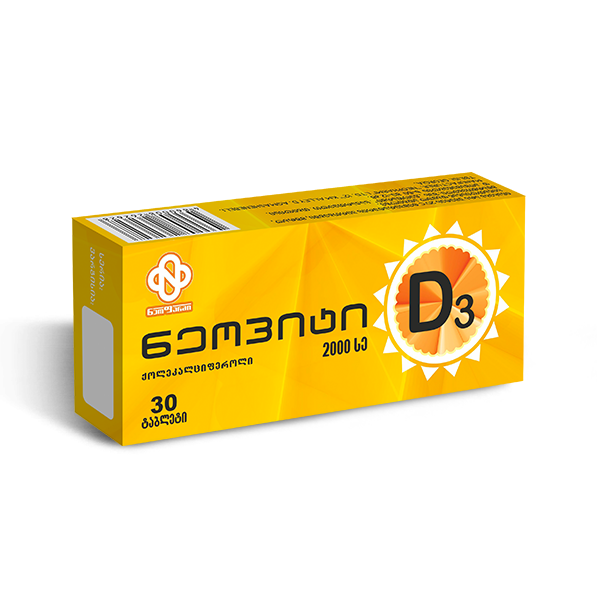APPLICATION INSTRUCTION
PARAMEDICAL MEAN
NEONEOVIT D3 – 2000 IU; 5000 IU
Pharmacological group: food supplement (mono vitamin source).
International name: Cholecalciferol.
Tablet composition: 1 tablet “Neovit D3” 2000 IU contains 50 mcg of vitamin D3 (cholecalciferol). 1 tablet “Neovit D3” 5000 IU contains 125 mcg of vitamin D3 (cholecalciferol).
Excipients: lactose, disubstituted calcium phosphate, starch, povidone, α-tocopherol, magnesium stearate.
Recommended use: Recommended use as a food supplement as an additional source of vitamin D3 (cholecalciferol) to maintain optimal levels in the body.
Description: “Neovite D3” contains vitamin D3 – a vital vitamin that is necessary for the functioning of practically all organs and systems of the human body.
When taken orally, vitamin D is practically completely absorbed (up to 80%). Due to the formation of micellar compounds in the distal part of the small intestine. Cmax in tissues is reached after 4-5 hours, after which the concentration decreases slightly and remains at one level for a long time.
The role of vitamin D in vital processes in the body. It is used in complex therapy as an aid. skeletal system. Participates in the regulation of phosphorus-calcium exchange: promotes calcium absorption in the intestines, regulates the level of calcium and phosphorus in the blood, activates bone metabolism. Helps increase bone strength and reduces the risk of developing rickets and osteomalacia.
Maintaining normal levels of vitamin D is essential at any age, especially For the elderly, when the risk of falling and injury increases. Vitamin D strengthens teeth by stimulating the formation of dentin, the main structural component, reducing the risk of caries.
Endocrine System. Vitamin D is involved in the regulation of almost all endocrine gland functions.
Metabolism of carbohydrates and fats. Vitamin D helps to improve carbohydrate-fat metabolism, has a positive effect on glucose and insulin metabolism, vitamin D deficiency is a risk factor for the development of insulin resistance. Vitamin DIt helps to reduce the level of cholesterol, low-density triglycerides and lipids in the blood and plays an essential role in the correction of obesity and metabolic disorders. Vitamin D inhibits lipid oxidation processes. cardiovascular system. Vitamin D has a positive effect on the walls of blood vessels and blood clotting processes, on the renin-angiotensin system, participates in the regulation of blood pressure, helps to normalize the tone of blood vessels. Muscular system. Helps improve muscle strength and neuromuscular conduction, which reduces the risk of falls and fractures.
immune system. Helps maintain healthy immune function by influencing both innate and acquired immunity. Affects the skin, respiratory tract and activating the processes of synthesis of own antimicrobial substances in the cells of the gastrointestinal tract, which reduces the risk of developing respiratory diseases (colds). Vitamin D regulates the synthesis of substances (anti-inflammatory mediators) by immune cells, which help suppress inflammatory processes in the body. reproductive system. Stimulates the synthesis of female and male sex hormones: estrogens, progesterone, testosterone. It has a positive effect on reproductive function in both women and men. Studies have shown that the risk of developing obstructive pulmonary disease in children decreases when the mother receives vitamin D3 during pregnancy. nervous system. Vitamin D participates in the regulatory processes of the nervous system with a positive effect on cognitive functions (memory, concentration, ability to absorb information, work capacity). Vitamin D has a neuroprotective effect – plays an important role in brain protection mechanisms against damage. By participating in the process of converting tryptophan into serotonin, it helps to raise the mood.
the skin It contributes to the intensification of metabolic processes in the skin and is a protective factor against skin aging. digestive system. Vitamin D has a positive effect on the homeostasis of the gastrointestinal mucosa, helps to protect, maintain and restore the integrity of the epithelial barrier. Thanks to the influence on the function of immune cells, it helps to suppress autoimmune inflammatory processes in the intestine. Regulation of energy exchange. By regulating the energy potential of cells, vitamin D helps to relieve fatigue and increase the body’s tone: under the influence of vitamin D, the production of ATP in the mitochondria of cells increases, which is a universal source of energy for all biochemical processes in the body. Regulation of cell growth. Vitamin D regulates cell growth, development and renewal.
Vitamin D3, called the “sunshine vitamin”, is produced in the human skin by exposure to ultraviolet rays from the sun and is converted into the active form of the vitamin (1,25-dihydroxycholecalciferol) in the liver and kidneys. of vitamin D3 The second natural way of intake is food products (the best way for this is fish, protein, liver, mushrooms). Due to being mostly in closed buildings, sufficient amount of vitamin D3 cannot be produced in the body and vitamin D3 deficiency develops. Also, in elderly people over 65 years of age, due to the increase in skin thickness, there is a decrease in the ability to produce vitamin D. In order to provide the body with a sufficient amount of vitamin D3, regardless of the time of year and exposure to sunlight, it is recommended to get it from an additional source.
Regular use of Neovit D3 2000 IU and 5000 IU ensures long-term replenishment of vitamin D in the body. Indication: it is used in complex therapy, as an aid mean: The use of “Neovite D3” is recommended
• to maintain normal vitamin levels;
• to strengthen teeth and bones; • to strengthen immunity;
• to relieve fatigue and raise tone;
• to strengthen muscles;
• to improve concentration and memory; To promote reproductive function.
Method of administration and dosage:
The tablet should be taken before meals, followed by a large amount of water.
The duration of taking the drug depends on the level of vitamin D in the blood. For this, you need to consult a doctor. Dosing of “Neovit D3” 2000 IU tablets. Children from 3 to 12 years old: take 1 tablet every 2nd day.
Children over 12 years old and adults: take 1 tablet per day.
“Neovit D3” 5000 IU tablets dosage:
Children and adolescents (11 to 17 years old): take 1 tablet once a week; Adults over 17 years: take 1 tablet every 2 days.
Precautions: Do not exceed recommended doses. A nutritional supplement cannot be used to replace a complete diet. The recommended maximum daily dose for adults and elderly persons is 4000 IU (100 μg/day). If necessary, the daily dose can be increased after consulting a doctor. Vitamin D3 should be supplied to the body in sufficient quantities during pregnancy and lactation. An overdose can have a negative impact on the health of the mother and child. Vitamin D3 during pregnancy should be taken only according to the doctor’s recommendation.
Side effects: manifestation of allergic reactions, development of signs of hypervitaminosis.
overdose. Symptoms of overdose are: loss of appetite, nausea, vomiting, constipation,Anxiety, thirst, diarrhea, headache, sleep disturbance, temperature rise.
Treatment: stop taking the drug and consult a doctor. Drink plenty of fluids.
Contraindication: Do not use in case of allergy to any component included in the food supplement, in the presence of celiac disease in the anamnesis.
production form: Primary packaging: No. 10 tablets in PVC/aluminum contour cell packaging.
Secondary packaging: 3 blisters are placed in a box with instructions. Dispensing mode: pharmaceutical product group III, dispensed without a prescription.
Shelf life: 2 years.
Storage conditions: Store in a dry, light-protected place at a temperature of no more than 25ºC.
Manufacturer: Ltd “Neopharmi”.
12th km, David Agmashenebeli alley, Tbilisi, Georgia.
Tel/Fax: +995 (032) 259-57-90; 259-64-46.

